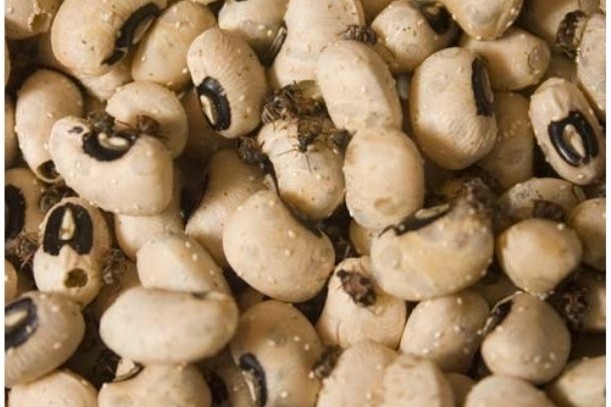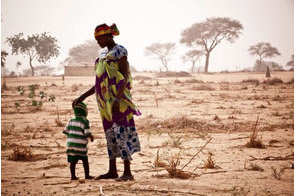Addressing pesticide food poisoning in Nigeria

Summary
A prominent setback for the commercialisation and commoditisation of bio-pesticide products, especially in developing countries such as Nigeria, is the registration barrier.
In response to the widespread attack of weevils on stored beans in various parts of Nigeria, bean traders started using 'Sniper,' a toxic pesticide containing 2,2-dichlorovinyl dimethyl phosphate (DDVP), to prevent weevil infestation. But following a public outcry over this practice, and to safeguard public health, the Nigeria Agricultural Quarantine Service (NAQS) released a statement last month, instructing bean traders to stop using the harmful product and withdraw all bean seeds that were preserved with Sniper.
The Minister of Agriculture and Rural Development, Audu Ogbe, also raised an alarm that the country was in a serious crisis due to the use of harmful chemicals like Sniper to preserve beans and other agricultural produces.
Exposure to Sniper and other pesticides containing DDVP can cause injuries to the human respiratory, cardiovascular and central nervous systems. Pesticides and other chemical contaminants can cause cancerous cells to develop in some organs of the body, including breast, colon, prostate, thyroid, lungs and liver. A United Nations report published last year showed that although pesticide use has been correlated with a rise in food production, approximately 200,000 people die each year from toxic exposure to pesticides.
Unfortunately, this is not the first time the country has witnessed the widespread use of harmful chemicals to control pests. Traders of agricultural products have long been in the habit of indiscriminately spraying pesticides and other chemicals on food items to stop the spread of bugs and other insects. Apart from Sniper, some traders also use aluminium phosphate to kill weevils in beans. Others use calcium carbide to ripen fruits. Dye is added to palm oil by some people. A number of poultry farmers use formaldehyde to improve the appearance of chickens to boost sales.
Recall that in 2015, the European Union banned the importation of some Nigerian agricultural products, especially beans because of high pesticide residues. But more than three years after the ban, not much has been done by the relevant ministries and National Agency for Food and Drug Administration and Control (NAFDAC) to find non-toxic alternatives to these toxic chemicals that traders and farmers have easy access to. Nor has there been a serious campaign to educate the general public on the health-related risks of using these chemicals.
It is not enough for the government to hold press conferences and release statements. More efforts must be put in place to fix the problem, particularly at the grassroots level. Whatever national pesticide policy NAQS aims to introduce to stop the use of chemicals must be well enforced, with the consequences of non-compliance clearly spelt out. Otherwise, much of the food in this country will be poison.
Government policies to safeguard public safety and health need to be accompanied by massive sensitisation campaigns in the media. This exercise must not just be about educating food crop traders and farmers. The general public also needs to be informed about the harmful effects of these hazardous chemicals.
For example, many households depend on Sniper to get rid of mosquitoes, cockroaches and other insects at home. Notwithstanding that this product is not for domestic use, it is less expensive than the approved insecticides for home use. One way to address the situation is to make the safe and approved insecticides affordable for low-income people.
As a researcher and organic pesticide developer, I have been involved in organising outreach events to reach out to farmer and trader groups and educate them on the dangers of indiscriminate use of pesticides. Efforts to get the Oyo State Ministry of Agriculture and Rural Development involved in this outreach did not achieve the intended result.
We also found that because the various diseases and health conditions caused by these hazardous chemicals do not take immediate toll on the farmers and traders, these people often ignore the need to take necessary health precautions. The immediate desire to keep their products away from insect pests and attract buyers takes precedence over any other concern.
Besides the silent, slow-killer pesticides and chemicals, there have been several instances of sudden death due to organophosphate pesticide poisoning. For example, in 2013, 23 children died in India after eating pesticide-tainted potatoes, rice and soy. We must also not forget the “killer beans” – the insecticide-treated brown beans that found their way into the Nigerian market in 1996, killing a number of people in the Southwest.
Children have a higher risk of exposure to harmful substances used in controlling pests. Research shows that exposing pregnant women to pesticides could cause birth defects in infants. Early exposure could also increase the incidence of brain cancer and leukaemia in children.
An essential approach to curb or eradicate the use of toxic chemicals in our food is to make safe alternatives available at affordable prices. Organic alternatives such as bio-pesticides, which do not pose health and environmental risks, should be developed, promoted and subsidized to mitigate the use of toxic chemicals.
Bio-pesticides include micro-organisms such as fungi and bacteria. Others are microscopic animals such as nematodes, and macro-organisms such as predators and insects. Products obtained from these organisms are used to protect plants and crops from pest attacks. Most of these bio-pesticides could be developed from plants within our immediate environment.
I have worked with some medicinal and insecticidal plants that are very effective against insect pests, especially weevils. My formulation from the distillates of a cocktail of herbs such as lemongrass, lime peels and hyssop achieves 100 per cent adult weevil and egg mortality within one hour of exposure to infested beans. It will also prevent re-infestation for at least two years after the first treatment. The efficacy of this organic formula was verified by the National Stored Product Research Institute in 2017.
But because of the high cost of production on a small scale, bio-pesticides are more expensive than synthetic pesticides, although they protect for a longer period than the latter. Production on a large scale could, however, lower production cost and expand access to more users. Licensing or partnering with big manufacturing, agro-allied or pharmaceutical companies could be a solution to this challenge of production cost.
Interestingly, many countries around the world have adopted the use of bio-pesticides. The Environmental Protection Agency (EPA) of the United States has registered 299 bio-pesticide active ingredients. In Brazil, bio-pesticides are mostly used on soybeans and orange crops. And many Brazilian organic products are exported to the EU and US. The rapid growth of the bio-pesticide market in Brazil is largely due to government support and the demand for organic and safe products. Indeed, the global bio-pesticide market was valued at $2.78 billion in 2016 and is estimated to reach $6.55 billion by 2022.
A prominent setback for the commercialisation and commoditisation of bio-pesticide products, especially in developing countries such as Nigeria, is the registration barrier. The regulatory system is designed for conventional chemical pesticides. Hence, this makes it difficult for regulators to favourably respond to the different properties of biological alternatives and move to adopt them for general use.
In other words, local analysts and regulatory bodies do not have biological standards on which the assessment of biological alternatives could be based. Given the important nature of the subject, regulators need to come up to speed in putting the necessary structures in place for licencing and supporting large-scale bio-pesticide production.
Coming up with useful alternatives to tackle problems in society is the forte of scientists and researchers worldwide. But without adequate attention by relevant agencies and authorities to adopt the inventions and solutions provided by researchers upon verification, societal problems would linger, with the attendant negative impacts on development. The widespread use of toxic chemicals in Nigeria is a case in point.
Embracing, developing and promoting the use of bio-pesticides to prevent and control insect attacks on agricultural products – both on the field and in storage – is a non-toxic approach that could end the indiscriminate use of toxic chemicals as food preservatives in Nigeria.
Financial Nigeria Columnist, Mojisola Karigidi, is a Nigerian biochemist and the founder and product developer at Moepelorse Bio Resources. She is also a Global Innovation Through Science and Technology (GIST) awardee, and an Aspen New Voices fellow.
Related
-
Food security in Nigeria and the world by 2050
Through agricultural R&D investment, the population at risk of hunger can be reduced by nearly a quarter by 2030.
-
FAO says 5.3 million people need food assistance in northern Nigeria
The FAO says ongoing civil insecurity impedes market functionality and food access to vulnerable households.
-
Stakeholders discuss financing and food security for post-COVID-19 Africa
AZA, MasterCard and Afreximbank and beneficiaries including Nigeria’s Alluvial Agriculture showcase collaborations.
Sustainable Development Section Sponsor
Most Popular
- India’s sustainable eating habits offer hope for climate change mitigation
- Unpaid care work prevents 708m women from participating in labour market
- Access Holdings and African art renaissance
- COP29: Multilateral development banks to boost climate finance
- Africa Finance Corporation facilitates $200mn financing for BUA Group









